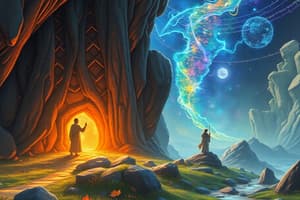Podcast
Questions and Answers
What is the main focus of Physical Sciences?
What is the main focus of Physical Sciences?
- Study of living organisms
- Study of formal systems and languages
- Application of scientific knowledge to practical problems
- Study of matter, energy, and the fundamental laws of the universe (correct)
Which of the following is an example of Applied Sciences?
Which of the following is an example of Applied Sciences?
- Logic
- Botany
- Biology
- Medicine (correct)
What is the primary goal of Experimentation in the Scientific Method?
What is the primary goal of Experimentation in the Scientific Method?
- To draw conclusions
- To test the hypothesis (correct)
- To form a tentative explanation
- To make systematic observations
What is a Scientific Theory?
What is a Scientific Theory?
Which of the following is NOT a branch of Natural Sciences?
Which of the following is NOT a branch of Natural Sciences?
What is the last step in the Scientific Method?
What is the last step in the Scientific Method?
What is the term for a fundamental change in the way scientists think about a particular field of study?
What is the term for a fundamental change in the way scientists think about a particular field of study?
What is the term for research that combines multiple fields of study to address complex problems?
What is the term for research that combines multiple fields of study to address complex problems?
Flashcards are hidden until you start studying
Study Notes
Branches of Science
- Natural Sciences:
- Study of natural phenomena and laws of nature
- Divided into:
- Physical Sciences:
- Physics: study of matter, energy, and the fundamental laws of the universe
- Chemistry: study of composition, properties, and reactions of matter
- Life Sciences:
- Biology: study of living organisms, their structure, function, and evolution
- Botany: study of plants
- Zoology: study of animals
- Physical Sciences:
- Formal Sciences:
- Study of formal systems and languages
- Includes:
- Mathematics: study of numbers, quantities, and shapes
- Logic: study of reasoning and argumentation
- Computer Science: study of information and computation
- Applied Sciences:
- Application of scientific knowledge to practical problems
- Includes:
- Engineering: application of science and mathematics to design and build structures, machines, and systems
- Medicine: application of science to prevention, diagnosis, and treatment of diseases
- Technology: application of science to develop new products and services
Scientific Methods
- Observation: making systematic observations of phenomena
- Hypothesis: forming a tentative explanation for the observed phenomenon
- Experimentation: designing and conducting experiments to test the hypothesis
- Data Analysis: analyzing data collected from experiments to draw conclusions
- Conclusion: drawing a conclusion based on the data analysis
- Verification: verifying the conclusion through replication and peer review
Key Concepts
- Scientific Theory: a well-substantiated explanation for a set of phenomena
- Law of Nature: a statement that describes a consistent pattern or relationship in nature
- Paradigm Shift: a fundamental change in the way scientists think about a particular field of study
- Scientific Revolution: a period of significant scientific progress and change
- Interdisciplinary Research: research that combines multiple fields of study to address complex problems
Branches of Science
- Natural Sciences study natural phenomena and laws of nature, divided into:
- Physical Sciences (study of matter, energy, and fundamental laws of the universe)
- Physics: study of matter, energy, and fundamental laws of the universe
- Chemistry: study of composition, properties, and reactions of matter
- Life Sciences (study of living organisms, structure, function, and evolution)
- Biology: study of living organisms, structure, function, and evolution
- Botany: study of plants
- Zoology: study of animals
- Physical Sciences (study of matter, energy, and fundamental laws of the universe)
- Formal Sciences study formal systems and languages
- Mathematics: study of numbers, quantities, and shapes
- Logic: study of reasoning and argumentation
- Computer Science: study of information and computation
- Applied Sciences apply scientific knowledge to practical problems
- Engineering: application of science and mathematics to design and build structures, machines, and systems
- Medicine: application of science to prevention, diagnosis, and treatment of diseases
- Technology: application of science to develop new products and services
Scientific Methods
- Observation: making systematic observations of phenomena
- Hypothesis: forming a tentative explanation for the observed phenomenon
- Experimentation: designing and conducting experiments to test the hypothesis
- Data Analysis: analyzing data collected from experiments to draw conclusions
- Conclusion: drawing a conclusion based on data analysis
- Verification: verifying the conclusion through replication and peer review
Key Concepts
- Scientific Theory: a well-substantiated explanation for a set of phenomena
- Law of Nature: a statement that describes a consistent pattern or relationship in nature
- Paradigm Shift: a fundamental change in the way scientists think about a particular field of study
- Scientific Revolution: a period of significant scientific progress and change
- Interdisciplinary Research: research that combines multiple fields of study to address complex problems
Studying That Suits You
Use AI to generate personalized quizzes and flashcards to suit your learning preferences.




